More than 90% of Fortune 500 companies outsource their web development and other operations to increase their productivity and keep their businesses growing according to Kearney. Outsourcing not only brings cost-efficiency but also, more importantly, enables businesses to get access to global talent. By using outsourcing for your business, you can reach your goals more efficiently, whether you’re a startup looking to build an MVP within designated timeframes or a well-established company looking to extend your in-house team with remote developers.
Keep reading our comprehensive guide on how to outsource your web development in 10 steps. This guide also covers a detailed review of the web development outsourcing models and the advantages of outsourced web development.

Types of web development outsourcing: location, relationship, and payment-based models
Have you ever heard of nearshoring, outstaffing, or fixed-price models and yet, find the differences among the latter to be vague? Let’s finally dot the i's and cross the t's by classifying each cooperation model you have ever heard of into three core groups: location-based outsourcing models, relationship-based outsourcing models, and payment-based outsourcing models.
| Criteria | Web development outsourcing models |
|---|---|
| Location |
|
| Relationship |
|
| Payment |
|
What about outsourcing vs outstaffing?
These two basic types of delegating software development to a third-party vendor are often confused. Let’s examine each and define which one would best suit you.
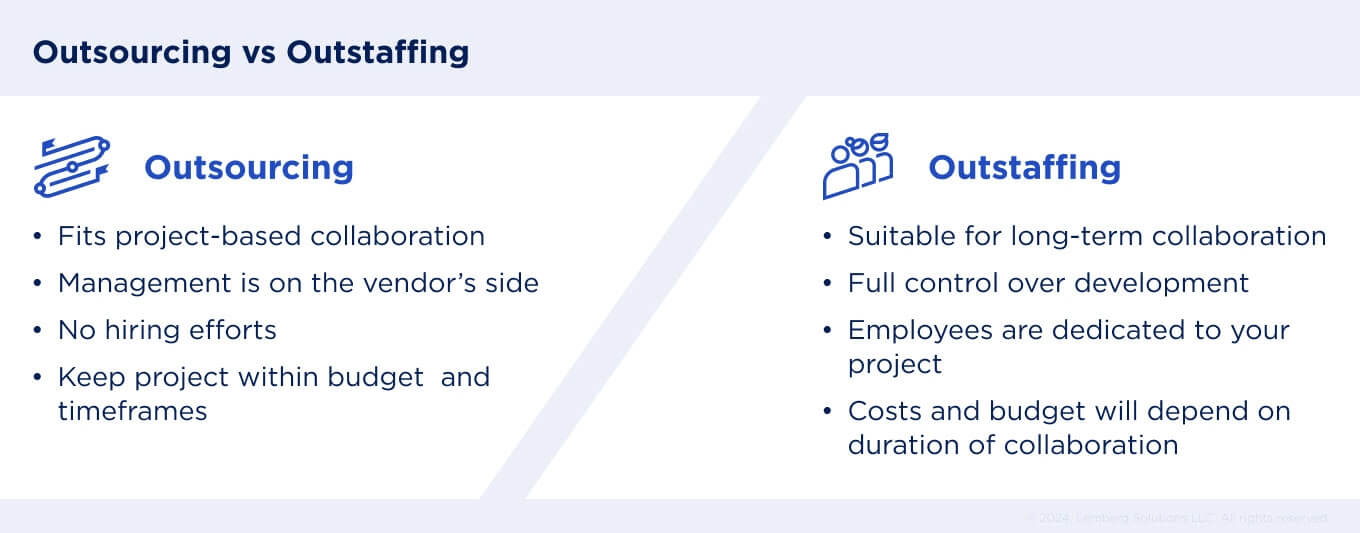
What is outstaffing?
Outstaffing is a type of outsourcing that presupposes hiring dedicated employees to work on your project full- or part-time. Outstaffing is also called team extension and is similar to hiring in-house employees, just remotely, as you’ll get the opportunity to work directly with professionals dedicated to your project.
If you’re looking for a professional in a specific field, yet there’s a tech talent shortage in your local market, outstaffing is the best option for you. With outstaffing, you can choose whether to manage the remote team on your side or delegate it to project managers on the vendor's side. Besides, you can be as involved in the management process as you need.
- Who can benefit from outstaffing?
Opt for outstaffing if your focus is a long-term collaboration that is not limited to a project with a limited scope. Outstaffing gives business owners full control over the remote web development process. This means you can manage remote employees similarly to the in-house ones.
What is outsourcing?
Outsourcing is a type of remote collaboration that is commonly project-based and can be also called end-to-end product development. Web developers and other tech professionals working on your project can simultaneously work on several other projects. This type of cooperation suits businesses with structured project requirements or a specific goal they want to achieve with outsourcing.
Besides, with outsourcing, management of the remote team is on the vendor’s side. However, you can discuss individual project involvement terms with the vendor.
- Who can benefit from outsourcing?
Outsourcing best fits companies that are looking for project-based collaboration. With outsourcing, you can easily keep your project within the specified budget and timeframes. It’s also an option for companies that don’t require direct management of the external team.
When to outsource web development?
Check out the most widespread reasons businesses outsource website development and see whether some of these match your specific business case:
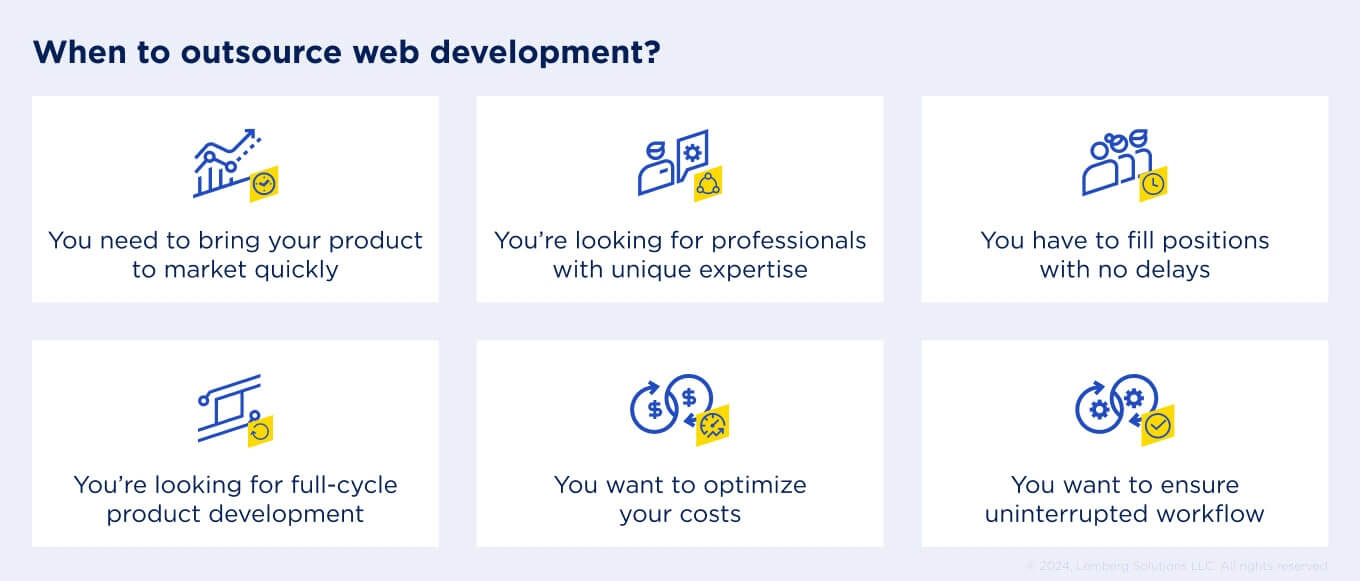
- You need to bring your product to market quickly.
- You need to hire professionals with unique expertise.
- You want to fill positions with no delays.
- You’re looking for full-cycle product development.
- You want to optimize your costs.
- You want to ensure uninterrupted workflow.
Many businesses choose to outsource web development services as it can solve several of their challenges at a time. If you’re considering solving any of the above issues, don’t hesitate outsourced website development is an optimal solution for your business.
10 Steps to Outsource Web Development Successfully
While you’re only considering outsourcing, the launch of your outsourced project might seem to be overwhelming. We understand your concerns and want to make your outsourcing experience as smooth as possible.
For this, we outlined 10 simple steps to help you kick-start your outsourcing journey today. Make no stay and get down to the steps:
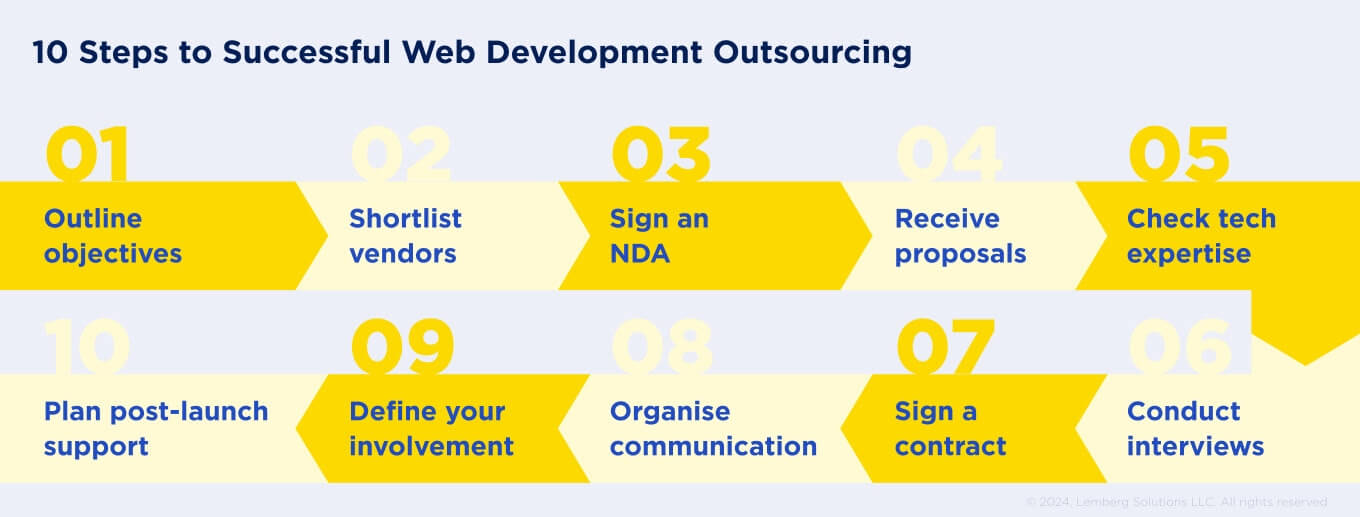
1. Define clear project requirements and objectives
Outline the goals you aim to achieve with outsourcing. Whether you’re looking to build a website from scratch or need a specific module development, clear goals will help you build efficient collaboration.
However, don’t waste too much time deliberating on the architecture and technologies. Find an outsourcing vendor that provides a solution discovery service. This way, you can analyze your business objectives from a technical perspective with industry experts.
2. Research and shortlist outsourcing vendors
Analyze potential outsourcing agencies, paying attention to the outsourcing rates, vendor’s market reputation (check public reviews), industry experts working in the company, and experience with projects similar to yours. You can also shortlist vendors based on preferred location, as besides rates, location affects the time difference and cultural specifics.
For example, outsourcing to Asian and African countries is cheap, the hourly rate ranges between $25 and $45; however, the cultural barriers and service quality will eventually come at the cost of your time and reworkings. That’s why outsourcing to Eastern Europe is considered as a viable option, as you get to work with top industry experts at moderate rates, ranging between $30 and $65 per hour.
3. Sign a non-disclosure agreement
To safeguard your intellectual property and business strategy, sign an NDA before discussing detailed web development projects that involve sensitive information.
Remember to specify security obligations concerning your access credentials, trade secrets, internal analytics, etc. Better yet, consult an attorney specializing in non-disclosure agreements to ensure you manage the process appropriately from the start.

4. Request proposals
You can request proposals on further steps with your project from several vendors. This way, you’ll analyze the timelines, costs, and technology offerings to choose the best tech partner for your specific case.
5. Check the vendor’s technical expertise
You can contact the outsourcing company and discuss their company’s tech expertise in detail. If you have a technical expert in-house, let them talk to your potential outsourcing vendor to avoid missing out some important technical aspects. You can also check the accomplished projects to see whether the vendor has had the experience of solving challenges similar to yours.
6. Check CVs and conduct interviews
Conduct interviews with experts that will potentially work on your project development. Outline the comfortable interview procedure, making sure you engage technical experts from your side. Rely on your business and technical requirements, as well as soft skills of the candidates.
7. Negotiate and sign the contract
Once you’ve chosen the tech partner, discuss the project scope, deadlines, payment terms, confidentiality, intellectual property rights, and other conditions. After you agree on all points, outline and sign a contract.
8. Set communication flows
Structure straightforward communication guidelines. This involves outlining the preferred tools for communication (Slack, Trello, Zoom, etc.) and designating contact persons on both sides.
At Lemberg Solutions, we use Scrum methodology for project management. For smooth collaboration, we use the reporting software Jira. We use Confluence for team management solutions, Figma for design management, and Git for software management.
9. Define your desired involvement in the process
You can be as involved in the process of your project development as you wish. You can delegate the management of your project to the vendor or stay actively involved in the daily routines of your remote team. Whatever your choice, reviewing the progress and providing feedback regularly is a key to successful collaboration.
10. Plan for post-launch review and support
Discuss a plan for ongoing support and maintenance activities with your vendor to ensure your product is always up and running. These may include ongoing support, updates, and maintenance. You can also request any improvements and enhancements in the following project iterations with your vendor.
At Lemberg Solutions, we provide SLA, on-demand, and dedicated team models for our support and maintenance services. With SLA agreement, we provide assistance according to the pre-defined terms and conditions. With on-demand support, you’ll receive all necessary maintenance when you need it, while a dedicated model presupposes you have a full-time team securing your website.
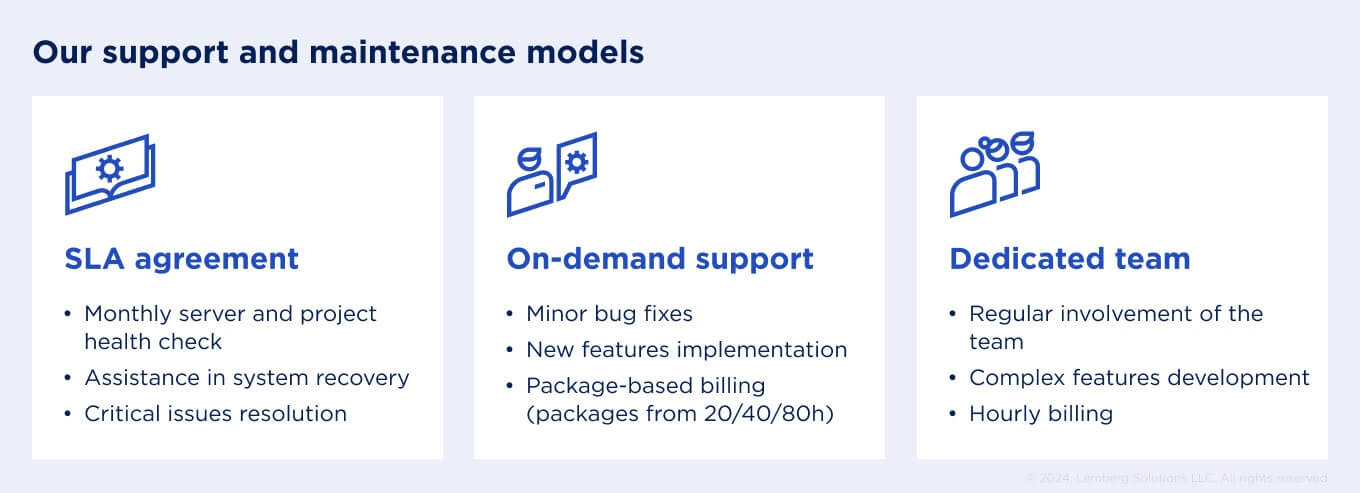
Following the above steps will ensure you outsource web development smoothly and reach your goals according to your requirements.
Exploring 8 Core Benefits of Outsourcing Web Development
Businesses from around the globe outsource web development for several reasons, including the desire to cut costs, lack of local expertise, increased competition, etc. Check out more in the statistics collected by Deloitte:
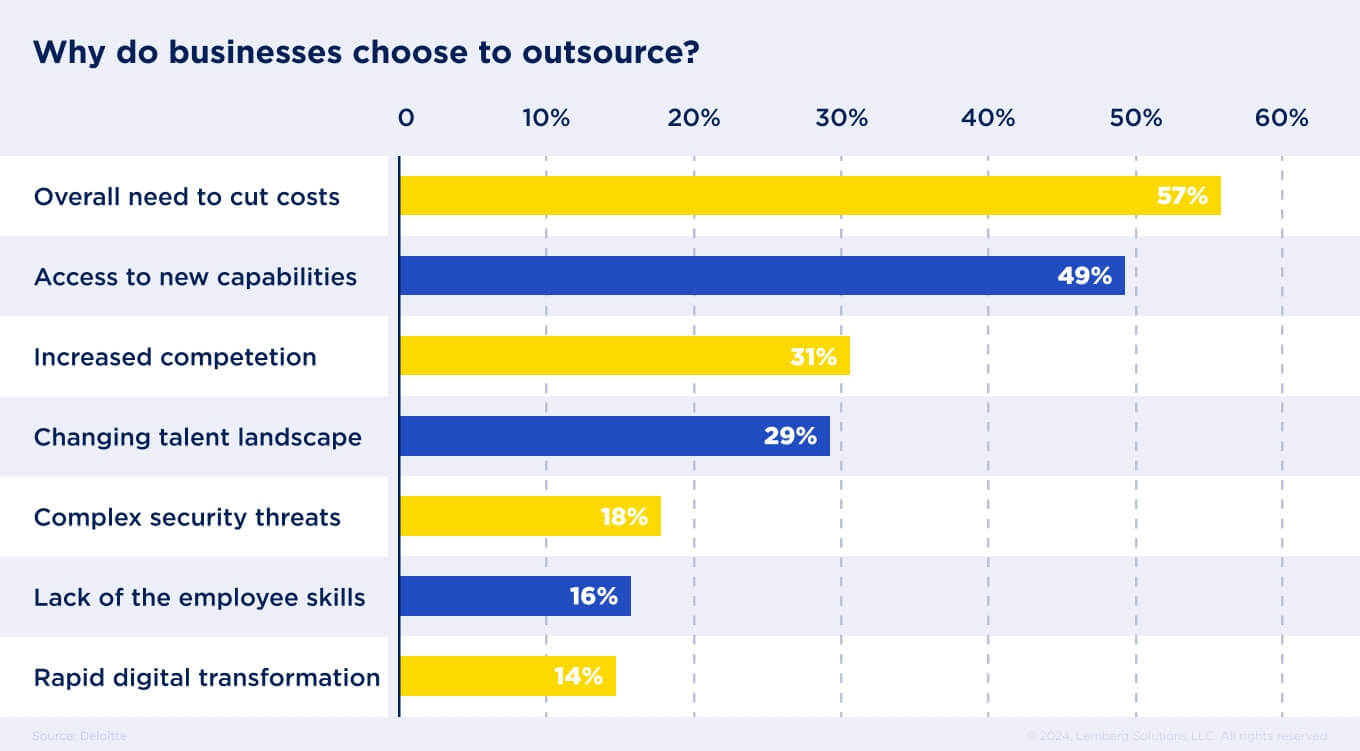
If you’re still hesitating whether outsourcing web development is right for you at this point, check out the eight benefits of outsourcing that will help you make up your mind:
1. Cut website development and management time
The majority of businesses admit that they chose outsourcing website development to free up time for core business activities, according to Deloitte. Managing a website is a time-consuming process, not to mention the multiple other business operations and deadlines you must coordinate.
2. Reduce software development costs
Hiring highly skilled developers at lower prices is a win-win opportunity for businesses. No wonder cost reduction is the second top reason businesses outsource website development, according to Deloitte.
3. Access to global talent
Outsourcing is a reliable solution if you’re experiencing a lack of tech talent in your local market. When hiring an outsourcing agency, you get access to experienced developers specializing in versatile domains, including rare technologies and frameworks.
4. Staffing flexibility
With outsourcing, you won’t have to search for engineers with rare specializations for months, as you get access to a vast talent pool globally. This means you can quickly adjust to your business needs by growing or reducing your team when needed.
5. Reduced management overhead
Outsourcing eliminates the need for you to manage an in-house development team, saving you the time and effort required for recruitment, training, and ongoing management.
6. Improved risk management
Experienced outsourcing providers are skilled in risk management and can help identify potential risks early in the project. They will assess team performance and ensure the project is managed according to applicable security standards. Make sure to check the vendor's approach to risk mitigation before entering into an agreement with them.
7. Adaptability to emerging technologies
Tech vendors always stay updated on the latest technological trends. This enables your business to quickly adapt to emerging technologies and incorporate them into your website without the need for extensive research or training.
8. Continuous maintenance and support
Many outsourcing partnerships include ongoing maintenance and support services. These services ensure that your website remains up-to-date, secure, and functional even after the initial development is complete.
Why outsource with Lemberg Solutions?
There are several reasons why businesses worldwide choose Lemberg Solutions as an outsourcing web development company. Among these are high security and management standards, 15+ years of market experience, qualified software engineers, end-to-end development, and flexible cooperation models.
If you’re looking to hire a web development team, Lemberg Solutions will help you manage the process from requirements elicitation to delivery of a market-ready product and ongoing support. LS’ digital expertise spans UI/UX design, web development, mobile development, and quality assurance so that you can cover all of your business goals with Lemberg Solutions.
Сonclusion
Let’s recap the key insights about outsourcing web development to ensure you get the most out of our comprehensive guide and can start your outsourcing journey today.
First of all, determine which outsourcing model fits you best. After you have chosen your preferred type of collaboration, move on to the following steps of software development outsourcing:
- Define project requirements and objectives.
- Shortlist outsourcing vendors.
- Sign an NDA.
- Request proposals.
- Check the vendor’s technical expertise.
- Conduct Interviews.
- Negotiate and sign the contract.
- Set communication protocols.
- Define your desired involvement in the process.
- Plan for post-launch review and support.

Frequently Asked Questions
What are the benefits of outsourcing?
The benefits of outsourcing web development include reduced costs and risks, increased efficiency, access to scarce tech talent, and flexibility. Outsourcing fits any type and size of business and can bring you specific value depending on your needs. Suppose you’re a startup owner and need to build an MVP quickly and efficiently but don’t have a fully-fledged development team yet. In that case, outsourcing will help you develop your product prototype within a specified budget and timeframes. Outsourcing is also an optimal solution if you have an in-house development team and need to hire tech talent with specializations that are scarce in your local market.
What are the challenges of web development outsourcing services?
Though there are some potential challenges you may come across while you outsource web development, you can solve each of them with well-structured communication and planning. Among the concerns of web outsourcing are poor communication, hidden project costs, and cultural barriers. The best way to avoid the enlisted and other concerns while outsourcing is to opt for a reliable tech partner. Before starting a collaboration with a tech vendor, check their past projects, talk to leading engineers, and contact their existing clients to learn more from their experience with the vendor.
How to minimize the risks of outsourcing?
Experienced outsourcing vendors have efficient risk mitigation strategies in place. However, you can also enforce risk mitigation activities on your side. For example, you can discuss critical issues, check whether your business goals are achieved with specific regularity, and establish quality standards the vendor will stick to.
How much does it cost to outsource web development?
The cost of website development outsourcing strongly depends on several factors, starting from the scope of your project, the specialization of developers, and the cooperation model. If your budget is fixed, you can opt for a fixed-price cooperation type and work with your chosen vendor on a project-based outsourcing model.
How to build an outsourcing website development strategy?
Before starting a web development outsourcing project, build an outsourcing strategy according to your business and tech needs. First, define your project goals and requirements, then decide on your budget. After this, research available outsourcing companies and leave up to five companies that fit you best. After that, analyze each vendor meticulously and contact a few to learn more about their offers for your specific case. Finally, choose the vendor you prefer and start your outsourcing project.

